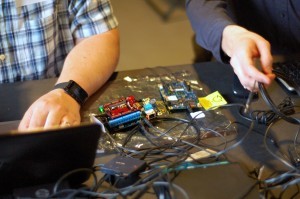The idea of making things and creating things, especially in the digital realm, has captured the imagination of many digital pioneers. Just head to the New York Maker Faire in New York City this fall and you'll see miles of aisles of do-it-yourselfers and tinkerers who embody the spirit of creation.
Now, contrast the excitement of making things to who and what are actually making money in the tech world. The most successful companies in the tech sector over the last few years make absolutely nothing! As a matter of fact, they pride themselves in making nothing and owning nothing.
A few examples: AirBnB owns no hotels. Uber owns no taxi cabs. Amazon is a store that sells other peoples stuff. Facebook creates no content. What these guys do is organize. They create a frictionless environment to match people who need things with people who have things.
It's the antithesis of the Maker Movement.
For the Maker Movement to grow up it's going to need to incorporate some of this organizational common sense. I'd be thinking hard about how to connect makers and the things they make, with the people who need them. Or, connect skilled makers with the people who need those skills.
I'd also turn up the megaphone about the benefits to thinking like a "maker." Even if it doesn't involve the creation of a physical thing, maker's problem solving mentality is a healthy asset for anyone in the new economy. Crafting solutions to problems is what it's all about.
Finally, colleges and universities need to incorporate maker principles with the same ardor they've begun to incorporate entrepreneurial programs. Collaborative workspaces where everything from tools like 3D printers to high tech sewing machines, from drones to high end production cameras should be available on every campus and incorporated into every academic major.
Since Stewart Brand founded the Whole Earth Catalog way back in the early seventies, and since the Maker Movement has come of age, it only touches a tiny sub-sector of do-it-yourselfers. In order for the Maker Movement to grow up, it needs to take a little lesson from those companies that make nothing but connections and start systematizing a way to maker profitability and employability.
The makers shall inherit the earth but only if they start growing up.
Robin Raskin is founder of Living in Digital Times (LIDT), a team of technophiles who bring together top experts and the latest innovations that intersect lifestyle and technology. LIDT produces conferences and expos at CES and throughout the year focusing on how technology enhances every aspect of our lives through the eyes of today's digital consumer.

